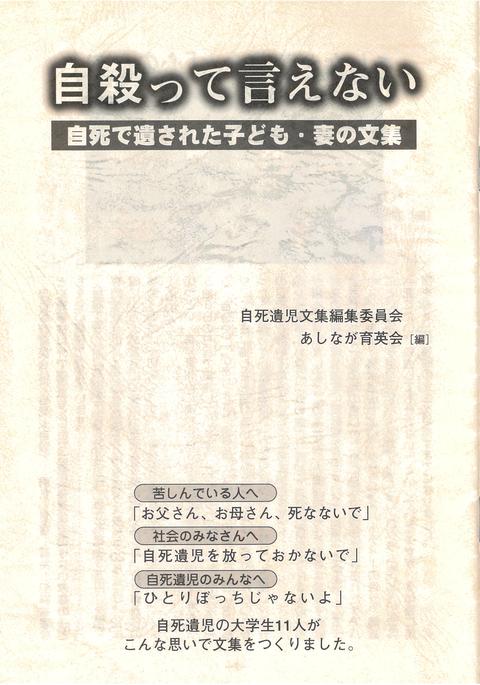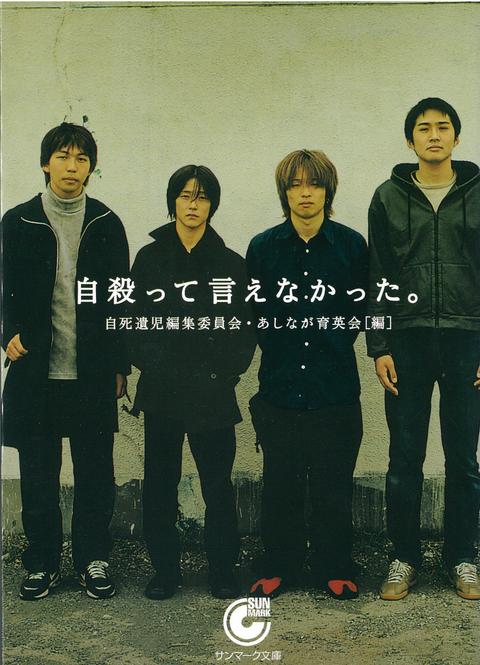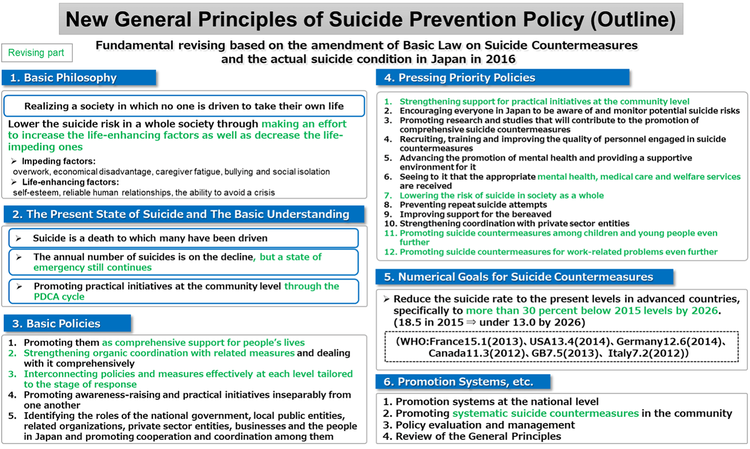

Outline of Suicide Countermeasures
History of Suicide Countermeasures
“It is the weak people who commit suicide,” “They died for their own reasons.” Symbolized by these comments, suicide used to be considered as a personal problem, but it has been broadly recognized as a social problem since October 2006, when the Basic Act on Suicide Prevention went into effect. Since the Law has passed, suicide countermeasures has been promoted comprehensively throughout the country. The Law was amended in 2016 and suicide countermeasures in our country has been largely changing in line with the times. For instance, all prefectures and municipalities came to be required to formulate suicide countermeasure plans of their own (mandatory development of local suicide countermeasure plans) to realize a society in which no one is driven to take their own life.
To realize a society in which no one will be driven to take their own life
Suicide is for weak people.
They died for their own reasons.
Suicide, which used to be considered a personal problem, has been broadly recognized as a social problem since October 2006, when the Basic Act on Suicide Prevention (Basic Act) went into effect. Suicide countermeasures has been promoted comprehensively throughout the country. A decade later, in 2016, the Basic Act was largely amended requiring all prefectures and municipalities to formulate local suicide countermeasure plans based on the reality of suicide in their region so as to promote suicide countermeasures as "inclusive support to stay alive" anywhere in Japan (Obligation of setting local suicide countermeasure plans). Therefore, suicide countermeasures in Japan is moving forward to realize a society in which no one will be driven to take their own life as stated in Article 1 (Purpose) of the Basic Act.
The circumstances before suicide becoming a social issue (up to 2006)
The focus was on measures against clinical depression and mental health problems in the workplace
In Japan, suicidal issues have scarcely been considered a political agenda until the upsurge in suicides in 1998. Even after that, no national basic policy for suicide countermeasures had been formulated. The reality was that each government ministry implemented its own independent measures, regardless of whether they count as suicide prevention or not. They include measures against clinical depression by the Ministry of Health, Labor and Welfare and measures for mental health problems in the workplace.
The voices of suicide survivors and private organizations became a step toward making suicide a “social issue”
Under these circumstances, there have been strong calls for the implementation of suicide countermeasures for individuals as well as society from suicide survivors and private organization engaged in suicide prevention activities or support bereaved families.
In May 2015, a symposium titled “What we can do now to prevent suicide” was held at the House of Councillors Building, co-hosted by nongovernmental organization LIFE LINK and voluntary members of the Diet. In July of the same year, a resolution calling for the urgent and effective promotion of comprehensive suicide countermeasures was unanimously passed at the House of Councillors Committee on Health, Welfare and Labor.
In response, in December, the government compiled the Government's Comprehensive Suicide Countermeasures to comprehensively promote suicide countermeasures with the cooperation of related authorities.

Cannot Say Suicide Out loud――Collection of Essays Written by Children and Wives Left Behind by Suicide
Edited by Bereaved Children Editorial Committee & Ashinaga Scholarship Society (2000)

Couldn’t Say Suicide Out loud.
Edited by Bereaved Children Editorial Committee & Ashinaga Scholarship Society(2005, Sunmark Bunko)
The two books of memoirs about their experiences and sufferings evoked massive response in society. They were written by suicide-bereaved children who are now university or vocational school students receiving scholarships from the Ashinaga Scholarship Society.
Enactment of the Basic Act on Suicide Prevention (2006)
Petition drive for legislation
In 2006, private organizations engaged in suicide prevention activities and support for bereaved families led a nationwide petition drive called "30,000 signatures calling for suicide countermeasures legislation" in the belief that legislation for suicide countermeasures is necessary to ensure that the government's suicide countermeasures are implemented and to promote effective and comprehensive suicide countermeasures. As a result, over 100,000 signatures were submitted to the President of the House of Councillors.
Submission of a bill by the multi-party Voluntary Association of Diet Members for Suicide Countermeasures
A multi-party Voluntary Committee for Suicide Countermeasures was formed in the Diet to consider the bill of Basic Act on Suicide Prevention. The bill was passed by the plenary session of the House of Councillors on June 9, 2006, and by the plenary session of the House of Representatives on June 15, 2006. It was promulgated as the Basic Act on Suicide Prevention on June 21, 2006, and came into effect on October 21, 2006.
Promotion system of suicide countermeasures in Japan was established
Based on the Basic Act, the Council for Comprehensive Suicide Countermeasures was established in October 2006, chaired by the chief cabinet secretary and composed of relevant cabinet ministers designated by the prime minister. In addition to preparing the draft of the General Principles, the Council is responsible for coordinating with related administrative agencies necessary for suicide countermeasures, deliberating on important matters related to suicide countermeasures, and promoting its implementation. It also functions as a framework to unify and promote suicide countermeasures that extend over various government ministries. In April 2007, the Office for Policy of Suicide Prevention was established in the Cabinet Office to serve as the secretariat for the Council for Comprehensive Suicide Countermeasures.
Principle for Basic Act on Suicide Prevention
As a basic principle of the Basic Act on Suicide Prevention, Article 2, Paragraph 2 stipulates that “Suicide countermeasures must be implemented as a social initiative, taking into account that suicide should not be viewed only as a problem of the individual, but also as a social problem with various social factors behind it.” This was the first time that suicide was regarded as a social problem.
It also stipulates that “Suicide Countermeasures must be implemented on a comprehensive basis through the organic coordination of measures and policies related to health, medicine, welfare, education, labor, and other relevant issues (Article 2, Paragraph 5).” Measures are now being implemented not only from a mental health perspective but also in line with the reality of suicide.
Enactment of the General Principles of Suicide Prevention (2007)
The first development of the General Principles of Suicide Prevention (2007)
The Basic Act on Suicide Prevention stipulates that a basic and comprehensive outline of suicide countermeasures be formulated as a guideline for suicide countermeasures to be promoted by the government. Based on the three basic perceptions of suicide listed below, the General Principles presented a basic idea that in promoting suicide countermeasures, we should take into account social factors such as unemployment, bankruptcy, multiple debts, long working hours, and etc. in a comprehensive manner.
The three basic perceptions of suicide are:
People who take their own life are driven to suicide
Suicide can be prevented
People who are contemplating suicide are giving off signs of help-seeking
Also, a numerical target of suicide countermeasures was set to “reduce the suicide death rate of 2005 by at least 20% by 2016.” It was decided that the General Principles would be reviewed approximately every five years.
Development of frameworks to promote local suicide countermeasures
Following the enactment of the Basic Act on Suicide Prevention and the formulation of the General Principles of Suicide Prevention, the departments in charge of suicide countermeasures were clarified in each prefecture, and councils such as liaison councils of suicide countermeasures were established in all prefectures by the end of fiscal 2008 as a place to discuss suicide countermeasures with related organizations and groups in various fields.
Emergency Enhancement Project for Local Suicide Countermeasures
Emergency Enhancement Fund for Local Suicide Countermeasures (2009)
The Cabinet Office has allocated 10 billion yen in the fiscal 2009 supplementary budget to create Emergency Enhancement Fund for Local Suicide Countermeasures to be used by prefectures over the next three years to strengthen local suicide countermeasure capabilities. This is based on the fact that the annual number of suicides has exceeded 30,000 for 11 consecutive years since 1998, and concerns about the worsening of unemployment, bankruptcy, and multiple debt problems, which are social causes of suicide against a background of severe economic conditions, have made it an urgent issue to strengthen local suicide countermeasures as part of a safety net for those who are trapped.
The 10-billion-yen budget for the Emergency Enhancement Fund for Local Suicide Countermeasures was allocated based on the population of each prefecture, the number of suicides, etc. Each prefecture enacted ordinances and formulated plans that included the details of the projects to be implemented. The contents of the funded projects were selected by each prefecture based on local conditions from among 5 menus proposed by the government: "face-to-face consultation support projects," "telephone consultation support projects," "human resource development projects," "dissemination, raising awareness and education projects,” and “enhanced model projects.”
The Second General Principles of Suicide Prevention (2012)
Shift to suicide countermeasures focusing on practical efforts at the local level
In 2012, the General Principles were reviewed and the goal of "a society in which no one is driven to take their own life" was proposed, and "a shift to suicide countermeasures focusing on practical efforts at the local level" was pointed out as a future challenge. The two basic ideas of comprehensive suicide countermeasures were added: to promote measures based on the actual situation of each target group and to identify the roles of the national government, local governments, related organizations, private organizations, businesses, and citizens in order to promote their cooperation and collaboration.
Achievement of the initial numerical target
In the first and second General Principles, the numerical target was set to reduce the suicide death rate by at least 20% by 2016 compared to 2005. The suicide death rate in 2005 was 24.2, and reducing this by 20% would be 19.4. The suicide deathrate in 2016 was 16.8, a decrease of 30.6% from the 2005 rate, exceeding the target by 10.6 percentage points.
Suicide countermeasures operations transferred to the Ministry of Health, Labour and Welfare (2016)
The task of promoting suicide countermeasures was transferred from the Cabinet Office to the Ministry of Health, Labour and Welfare as of April 1, 2016.
Background of the transfer to the Ministry of Health, Labour and Welfare
Toward closer collaboration with the frontlines
Since the enactment of the Basic Act on Suicide Prevention (2006), the Cabinet Office has twice formulated the General Principles of Suicide Prevention, and various efforts have been made in line with them, resulting in a steady decrease in the number of suicides to about 24,000 per year.
On the other hand, it was considered that it will become more important to shift the focus of suicide countermeasures even more on practical efforts at the local level. Because factors behind suicide vary, including health problems or economic deprivation, it had become essential to work closely with parties in the frontlines such as the health and welfare departments of local governments (which play a central role in local suicide countermeasures) and with employment agencies (which support economic independence). The transfer to the Ministry of Health, Labour and Welfare, which is closely related to these fields, was intended to further strengthen the system of suicide countermeasures.
On April 1, 2016, the Office for Policy of Suicide Prevention was established in the Ministry of Health, Labour and Welfare, and took over the duties that had been carried out by the Cabinet Office. On the same day, the Suicide Prevention Headquarters was established, headed by the Minister of Health, Labour and Welfare. In order to comprehensively promote suicide countermeasures, which cover a wide range of areas, the headquarters will work across the ministry by organically coordinating health, medical service, welfare, labor, and other related measures.
Revision of the Basic Act on Suicide Prevention (2016)
Background of the revision
As 10 years have passed since the Basic Act on Suicide Prevention was enacted, there has been a growing momentum among private organizations working on suicide countermeasures and Diet members promoting suicide countermeasures that the Basic Act needs to be reviewed based on the various findings and experiences accumulated over the past 10 years in order to further strengthen and accelerate suicide countermeasures in Japan.
In May 2015, an in-house meeting was held under the auspices of the NPO LIFELINK Suicide Prevention Support Center and co-sponsored by the National Network of Private Organizations for Suicide Countermeasures, the Association of Municipalities Creating a Suicide-Free Society, and the Association of Diet Members for the Promotion of Suicide Countermeasures, calling for the further promotion of comprehensive suicide countermeasures. A written request consisting of 12 items, including the revision of the Basic Act on Suicide Prevention, was submitted to the Association of Diet Members for the Promotion of Suicide Countermeasures.
In the Diet, the House of Councillors' Committee on Health, Labour and Welfare deliberated on the theme of comprehensive suicide countermeasures on June 2 of the same year, and a resolution calling for the further promotion of comprehensive suicide countermeasures was unanimously passed.
The amendment from the Association of Diet Members for the Promotion of Suicide Countermeasures was unanimously passed by a plenary session of the House of Councillors on February 24, 2016; it was unanimously passed and enacted by a plenary session of the House of Representatives on March 22, 2016, and went into effect on April 1, 2016.
Requirement for all prefectures and municipalities to formulate suicide countermeasure plans
The Basic Act on Suicide Prevention, which was amended on April 1, 2016, aims to contribute to the realization of a society where people can live in good health and with a sense of purpose by comprehensively promoting suicide countermeasures and enhancing support for the relatives of suicides, through setting forth the basic principles of suicide countermeasures, clarifying the respective responsibilities of the national government, local governments, employers, and citizens, and setting forth the basic matters of suicide countermeasures, with the aim of realizing a society where no one is driven to take their own life.
Prefectures are to formulate their own suicide countermeasure plans, taking into account the General Principles of Suicide Prevention and local conditions, and municipalities are also to formulate their own suicide countermeasure plans, taking into account the General Principles and prefectural suicide countermeasure plans as well as local conditions.
The Third General Principles of Suicide Prevention (2017)
Measures against suicide among children and youth became a priority policy
The Third General Principles include a new basic principle that suicide countermeasures should be promoted in the direction of lowering the risk of suicide in society as a whole by reducing " life-impeding factors " and increasing " life-enhancing factors. In addition, the following were included as basic policies:
- Suicide countermeasures is promoted as an inclusive support to stay alive
- Strengthen organic linkages with related measures and work on a comprehensive basis
- Effectively link measures at different levels according to the stage of the response
In addition, the number of priority measures, for the time being, has been expanded from nine in the Second General Principles to twelve, and new measures such as strengthening support for practical measures at the local level, further promoting measures against suicide among children and youth, and further promoting measures against suicide due to work-related problems have been included.
The promotion system for suicide countermeasures includes the promotion of systematic suicide countermeasures in local communities based on the revised Basic Act on Suicide Prevention.
New law enacted on nationally designated research organization to play a central role in suicide countermeasures (2019)
In order to further enhance suicide countermeasures, Law on Promotion of Surveys, Research, Utilization of Outcomes, etc. to Facilitate Comprehensive and Effective Implementation of Suicide Countermeasures" was enacted on June 6, 2019. A new system has been established whereby the Minister of Health, Labor and Welfare designates a nationally designated research organization to play a central role in research and study supporting suicide countermeasures and the utilization of the results of such research and study.
Japan Suicide Countermeasures Promotion Center becomes a nationally designated research organization (2020)
Promote multidisciplinary research and local suicide countermeasures support
In February 2020, Suicide Countermeasures Promotion Center became a designated research organization under the Law, and began its operations in April of the same year. Consequently, Japan Suicide Support Center (JSSC) at the National Center of Neurology and Psychiatry (NCNP) was abolished. From then on, the nationally designated research organization will play a central role in conducting research and studies as well as utilizing the results necessary for the implementation of comprehensive and effective suicide countermeasures that are linked to a wide range of related policies, such as health, medical care, welfare, education, and labor, as well as providing support for practical suicide countermeasures at the regional level.
Related New Topics
- November 28, 2025
- Call for papers : Suicide Policy Research (Volume 5, No. 1)
- October 9, 2025
- JSCP’s Online e-learning Training Program to Promote Suicide Countermeasures at Universities
- September 18, 2025
- Suicide Policy Research





